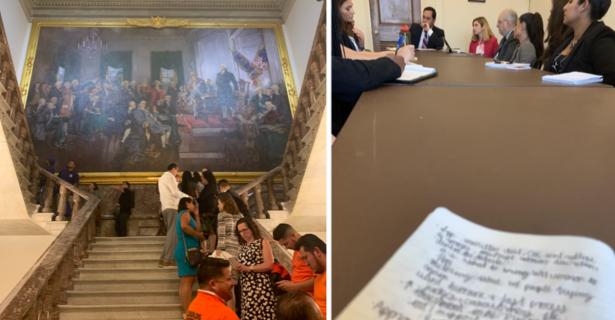It has been a thrilling first two weeks at the Immigration Hub in Washington, DC. On the second day of my internship, Tuesday, June 4th, I accompanied Hub staff to watch the House of Representatives pass the Dream and Promise Act of 2019, a landmark piece of legislation that protects the rights of DACA recipients, also known as DREAMers, and extends protections for Temporary Protected Status recipients. I listened as Speaker Pelosi gave a rousing call to action, calling on members from all sides to vote for this legislation, even as a member of the House disruptively chanted “Build the Wall!”. I watched from the gallery as freshman Rep. Joe Neguse of Colorado delivered an impassioned speech on the necessity of the bill, exclaiming “I rise today...as a son of immigrants, a son of African refugees. That I am able to stand in this chamber today with all of you is proof that the American Dream is real, and I want it to be attainable for generations to come. That is why we must pass HR 6 today. Right now.” Moments later, the House did just that. Surrounded by fellow advocates, immigrants, and DREAMers, I joined in a chant of “Si se puede!” and “Yes we can!”.
The Immigration Hub had been working for months with lawmakers on both sides of the aisle and other advocacy organizations, such as United We Dream, to bring this bill to the floor and the resounding 237 to 187 passage underscored the successful efforts of the Hub and its allies. In the following days, I learned more about how the Hub works to coordinate the efforts of other immigration-focused lobbying and advocacy firms, serving as a coordinator for action, communication, and legislative outreach.
My boss, and fellow EPIIC alumnus, Kerri Talbot, the Director of Federal Advocacy at the Immigration Hub, brought me with her to attend a meeting between fellow immigration advocates and the Chair of the Congressional Hispanic Caucus, Rep. Joaquin Castro of San Antonio, Texas (my hometown). Kerri and I sat with Castro as he asked us to help him strategize a response to the latest legislation that would fund an increase in detention beds and border patrol, masquerading as “humanitarian aid”. The group offered suggestions on how to explain what real humanitarian aid, which would include improved detention facility conditions, safe food and water, reliable medical care, and access to recreation and educational programs for detainees and asylees in American custody, looks like to reporters and fellow legislators, and we also explained what the proposed bill would accomplish (namely, none of the above).
Castro thanked us for the work we do in providing legislators such as himself with accurate, unbiased, and critical information that helps his caucus and party safeguard the rights of immigrants in Congress. I saw first-hand that it is not just monied lobbying firms with corporate interests that can exert control over the legislative process, but also advocates, immigrants, and students like myself, if only we are given the opportunity to have our voices heard. I am proud to be interning at an organization that seeks to elevate the voices of those who might otherwise go unheard and that uses its influence for a community-serving, rather than self-serving, interest.
Much of the Immigration Hub’s influence comes from the expertise and experience of its staff, such as Kerri, who have years of experience on the Hill itself. However, as a part of the Emerson Collective, the Hub also benefits from the philanthropic efforts of its entrepreneurial founder, Lorraine Powell Jobs. I was lucky enough to meet Lorraine during her visit to the DC Emerson Collective office last week, and I was impressed by her humility, grace, and passion. The following week, I participated in an Emerson Collective-wide conference call, led by Jobs, where she encouraged the various groups within the Collective to explain their recent efforts.
During the call, I heard Mitch Landrieu, former mayor of the City of New Orleans, speak about his new initiative, E Pluribus Unum, which is mapping and, hopefully, solving the epidemic of racism that still scourges the American South. I also heard Arne Duncan, former Secretary of Education under President Obama, speak about his initiative, Chicago CRED, which is implementing a revolutionary approach to reducing gun violence in Chicago. Hearing about these other Emerson Collective initiatives and working with the team at the Hub has showed me how research, targeted advocacy, and civic engagement can interact to create real change.
I cannot wait for the next six weeks of my internship, and I look forward to the many educational, transformative, and empowering experiences that I am bound to experience here at the Hub.

